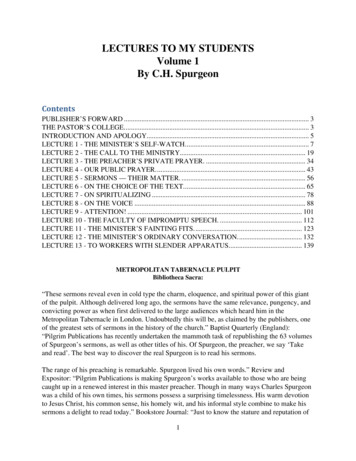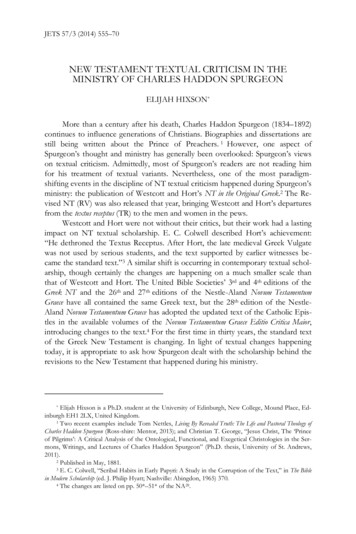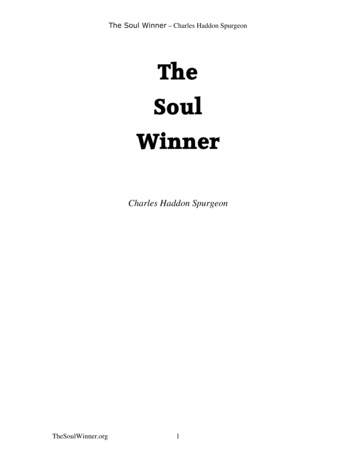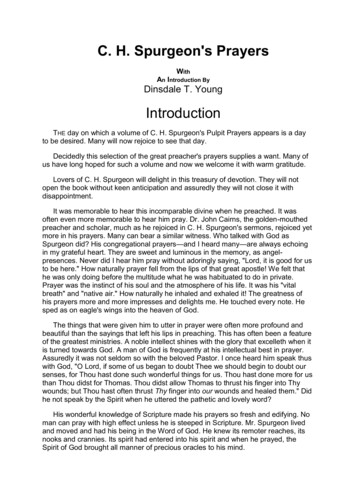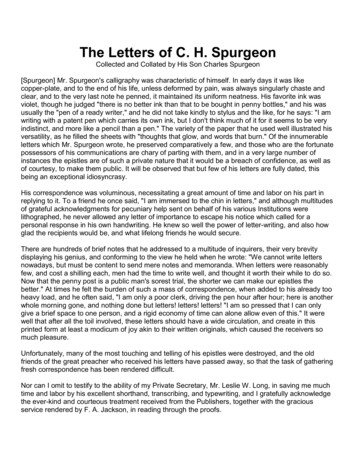
Transcription
The Spurgeon Centenary.Ill.SOCIAL LIFE IN SPURGEON'S DAY.N June 19th, 1834, Charles Haddon Spurgeon opened hiseyes on the world in a small, old-fashioned house atOKelvedon, in Essex. It would be interesting if we could have apeep at the world then; or at least at that part of it in which hewas destined to become so famous a figure. If we have industryenough to search for the facts, and imagination enough to clothethem with human form, that should not be impossible. But itwill not be easy., because the facts are so varied, and these 100years have affected such tremendous changes in our social life,that the most imaginative of us will find it difficult really to seethe England which they represent.Eight' years ago, J oseph McCabe wrote a book entitled,1825-1925, a century of stupendous progress. It contains a fundof information gathered from authoritative sources, on theprogress of wealth, the life of the worker, the social life of thepeople, the morals, education, and political life of the nineteenthcentury. In the preface of his book he states that his object is" to give clear, precise, and ample proof that there has been inthe last 100 years, more progress in every respect than had ever fore been witnessed in 500, if not a 1,000 years." . That thatClaim is not as extravagant as at first sight it appears to be, willshow the difficulty of our task.Figures are always difficult to make interesting and I amgoing, as far as possible, to escape from them, and give a fewbroad and rapid impressions of the England upon which the eyes. of Spurgeon opened.We will begin on the lighter side of life, the open air andrecreative side, of which we think so much to-day. . ImagineEngland just after the nineteenth century dawned. There we:t;:e,of course, no motor-cars, no charabancs, no trains (we are justcelebrating the centenary of railways), no excursions, no weekends, no trams, no buses, no bicycles. Coaches were the generalmeans of travelling and few but the gentry could afford them.Except for a friendly lift in a farmer's cart, or the luxury ofaseat in a carrier's van, no worker rode anywhere. No matterhow distant the place of his employment might be, he walkedthere in the morning and back at night. Very few working folk33722
338The Baptist Quarterlytravelled more than ten miles from their own home. If a son ordaughter went twenty miles from home they were rarely seenagain. Vi1Iager never saw a big town, a1?-d. sca:ce y any manwho lived ten mtles from the sea, ever saw It In hIS hfe.There were no picture-houses, of course, no football matches,no parks, no playing grounds. There were no bank holidays, nohalf-holidays, no holidays at all for workers, save Christmas Dayand the King's birthday, and occasional "Wakes" or fairs, ofwhich we get a glimpse in Dickens' Old CUl"iosity Shop . . Gameswhich fill, in some form or other, so large a part of the leisurehours of the people to-day, were almost, if not altogether, absent,and the four favourite recreations (?). were sex, drunkenness,fighting and gambling. .In fact that is a negative impression of the people's leisure,for the simple fact is that they had no leisure. Agriculturallabourers worked sixteen hours a day, while a ParliamentaryEnquiry revealed the fact that the average hours of adults (allover sixteen) was fourteen hours a day, for six days a week.Sunday was the only day the wage-earner had any leisure, andhe was too tired for any physical activity. He was left, on thatday, the alternative of the church or the chapel, and the alehouse, and he was often content to patronise both.Child-life, at least the child-life of the poor, is a horror evento think of. When Spurgeon came to London, Charles Dickens'novels were pouring from the press, and the story of the greatnovelist's own childhood allows us to see a little way into thetragedy of a child's life in London. Only a few years before. Spurgeon was born, Dickens, a hoy of twelve, was working longhours at a blacking factory for the miserable pittance of Is. perday, " A little lonely prey to the London streets." "I know thatI have lounged about the streets, insufficiently and unsatisfactorilyfed. For any care that was taken of me, I might easily havebeen a little robber or a little vagabond." And that picture, darkas it is, is not nearly black enough for the children of the poor,and the hosts of unwanted children. One of the darkest pagesin the story of the nineteenth century is that which deals withchild labour. Children, from the age of five, were worked twelveto fourteen hours a day in the mills and factories.· ThomasCarlyle, whose Sartor Resartus was given to the world the yearthat Spurgeon was born, wrote a letter in 1833, in which,referring to the factories, he speaks of "little children labouringfor sixteen hours a day, faIling. asleep over their wheels androused again by the lash of the thongs over their backs, or theslap of the 'billy-rollers' over their little crowns." Not until1834, the year of Spurgeon's birth, was any attempt made tomitigate the hardships under which they suffered. Then, through
The Spurgeon Centenary339the efforts of Lord Shaftesbury, child labour was limited to eighthours a day for children under thirteen.And that brings us to a glimpse, from another angle, at life100 years ago. The mind as well as the body was neglected.Recall Dickens' description of " Poor Joe," the crossing sweeper."He is not one of Mrs. Pardiggle's Tockahoopo Indians; he isnot the genuine foreign made savage; he is the ordinary, homemade article. Dirty, ugly, disagreeable to all the senses, in bodya common creature of the common streets, only in soul a heathen.Native ignorance . . . sinks his immortal soul lower than thebeasts that perish." There were thousands like that. No onebelieved that it was the duty of the Government to provide ascheme of National Education, and it was not until 1870 that.education was made universal and compulsory. There were afew attempts, mainly by religious people, to provide, some sortof education; a few charity schools, dame's schools; some"Do-the-Boys Halls," where children were exploited for gain;some ragged schools, night schools and Sunday Schools. But thechildren of the poor were left largely to "native ignorance." Inthe course of a year, according to an official'return of 1834, therewere found, in London alone, 3,098 children living as mendicantsor thieves.And that mental poverty was reflected through all the gradesof life among the wage-earners. The adults were largelyilliterate, and few of them could read. We know what interestand delight come to us through music and books. The piano,the gramophone, the wireless, are in almost every home. Manyof the greatest authors are on our shelves, and a flood ofnewspapers and periodicals are constantly issuing from the press.'We have even our Children's Newspaper. Which all means thatlife is for us rich in interest; the world is at our door, and our,intercourse with one another is informative and varied. We canhardly imagine what life would be without this mental activity.What would we do without our daily paper? A hundred yearsago no daily newspaper could be procured under sixpence. Itwas only a few years before Spurgeoncame to London that anew morning paper; the Daily News, of whiCh Charles Dicken!'lwas the first editor, appeared at fivepence. Books were withinthe reach of few; a cheap edition of the Arabian Nights, forinstance, cost six shillings and sixpence. There were no publicreading rooms, and no free libraries, and no penny post. Life,for the masses of the people, was without the interest and joy ofmental activity and interchange; and the world of thought andimagination was a hidden realm save to the few.The conditions under which the workers lived, either incountry or city, are difficult to imagine to-day. They were badly
340The Baptist Quarterlypaid badly fed, badly housed, and the most sober and industriouswer always fighting a hard battle with destitution, dirt anddisease. "There is a submerged tenth to-day," says J. McCabe,"whereas a hundred years ago there' was a submerged ninetenths," A Parliamentary Enquiry in 1825 (and things hadchanged very little by 1833), showed ten million workers.Three million children earned Is. per week.Two to three million women and girls earned less than men.Four to five million adult males, the overwhelming majorityof whom were agricultural or industrial labourers or factoryhands, earned 8s. to 12s. per week.One million domestic servants earned 3s. per week and theirfood.One million paupers.There were only a few thousand skilled artisans who earnedmore than 1 per week and very few of these more than 25s." When two millions of one's brother men sit in workhouses,and five million, as is insolently said, 'rejoice in potatoes,' thereare various things that must begin, let them end where they can,"wrote Thomas Carlyle in 1834, on what he called" the Conditionof-England question."My limited space will not allow me to dwell on the cost ofliving. Are not these years known to us as the "hungryforties"? A suggestive description? Almost every necessity oflife was dearer then than it is to-day, excepting beer, on whichthe skilled artisan spent a large part of his wage; for the sobrietyof the people, and the general outlook on drink and drinkinghabits, has tremendou!lly improved, at least amongst the workingclasses, in these 100 years.With no means' of transport and long hours of work, theworkers,' of necessity, were huddled together in tenements asnear as possible to their work, and commonly built back to back,so that there was no draught through the houses. Windowswere taxed, so light was a luxury; soap was taxed, so cleanlinesswas a luxury. There were no public baths, and· no water waslaid on to the houses. There was no Public Health Department,of course. Very few streets were paved, or lit, or cleansed, andthere was practically no drainage system. It was not until 1842that the Government procured "General Local Reports on thesanitary conditions of the working-classes," and the mass ofevidence coUected was' too revolting to publish. Our magnificentfree hospital treatment and cheap medical attendance are alldevelopments of the last 100 years, and the poor 'in birth andlife and death had little skilled care. Disease often stalkedabroad unchecked. You may recall Carlyle's "forlorn Irishwidow," who died of typhus fever; died and infected her lanei.
The Spurgeon Centenary341with fever' so that seventeen other people died there in consequence. "Very curious. The forlorn Irish widow applies forhelp. They answer, 'No; . impossible! thou art no sister ofours.' But she proves her sisterhood; her typhus fever killsthem: they actually were her brothers, though denying it." Thefirst year of Spurgeon's ministry in London an epidemic ofcholera broke out in the city from which over 6,000 died ineight weeks.We have still cause to be greatly troubled, concerning theslums of our towns and cities: but it is something that we aretroubled. The slum areas have become a matter of publicconscience. But 100 years ago there was pradically no conscienceat all about them, and no sense of responsibility for the hopelessmisery and crime that was bred in' them. I still have a horriblememory of an occasion in my boyhood, when I went with anuncle of mine to a common lodging-house in London; where hewas to conduct a service. But hopeless and horrible as that sightwas, it must have been infinitely worse when Spurgeon came toLondon, for it was only a few years before that Lord Shaftesburysecured the passing of his Bill for the control of the CommonLodging-House, which he described as an "inferno of povertywhere tens of thousands of miserable beings languished or rottedin lairs fitted to be the habitation of hogs than of human beings."This rapid, and wholly incomplete, glimpse into the "goodold days," for which we sometimes foolishly yearn, will havegiven us some idea of the London into which the Boy Preacherfrom Waterbeach entered in 1854, with his message of the Graceof God for sinful men. He, too, with his heart of compassion,could say with his great contemporary, Charles Dickens, "He rtof London . . . I seem to hear a voice within thee . . . biddingme, as I elbow my way among the c'rowd, to' have some' thoughtfor the meanest wretch that passes, and being a man, to turnaway with scorn and pride from none that bear the humanshape." And he had a greater Gospel than Dickens' gospel ofhuman kindness.But that is not, by a long way, the whole story. There isbrighter page to which we can turn. The year ofSpurgeon'sbirth may be regarded in a sense as the beginning of a new era.In June, 1832, the first Reform Bill was passed. The House ofCommons, previously to this, consisted of 489 members-332 ofwhich were returned from small boroughs in which a few scoreof voters either took orders from the lord of the district, orshamelessly sold their votes to the highestbiddets. London, witha tenth of the popUlation, had only four members. Manchesterand Birmingham had hone. The Reform Bill of 1832 altered allthat. Its enfranchisement was severely limited; it was not;a.
342The BaptistQuarter yindeed, until 1867 that the vote was given to all householders, butthe Reform Bill of 1832 marked the beginning of the reign ofthe middle-classes.And the middle classes, whatever their faults, were distinctlyreligious. "The qualities of the middle classes at their best,"says Leathes, in his People on T'f'iaJ, " were embodied in WiIIiamEwart Gladstone." The old story of Queen Victoria giving aNative Prince a Bible, with the remark that "that was thesecret of England's greatness," is quite possibly apocryphal, butit was representative of the general conviction of middle-classEngland. They did believe that it was righteousness whichexalted a nation, and that the essence of that righteousness wasin the Bible. The day after Spurgeon died, one of the dailypapers commenced its leading article with the words, "The lastof the puritans is dead," and during the first part of the Victorianera the middle classes did represent much that was best in thepuritans. The Victorian homes were religious; the Victorianhabits were religious, and Victorian politics were not divorcedfrom religion. The Victorian age, with its crinolines and antimacassars and Mrs. Grundy has become a sort of by-word inthese days of short skirts and unrestricted liberties, but it hadsome qualities that we have no need to dismiss with a smile. Itmay have taken itself too seriously, but it did believe that it hada duty and a destiny above cocktails and jazz, and it has something to show for its heavy seriousness. It was because the soilwas there, the soil of a genuine religious life, that the seed of anew social order began to take root in men's minds.If the novelist gives us the picture of the age in which helives, the prophet gives expression to the thoughts that are cryingout for utterance in the hearts of the people. The prophet isusually in front of his age, but he is in a real sense the productof the deepest thought and feeling of his age. A flood of lightis thrown upon the life of 100 years ago, when we· rememberthat when Spurgeon came to London two voices were speakingto all serious-thinking people. Ruskin (a frequent visitor to theTabernacle) was calling for a new definition of riches, andpreaching a political economy whose wealth was "the purpleveins of happy heartedhuman creatures"; while ThomasCarIyle was thundering forth the rights of man in· an age ofmachinery.Jesus has a little parable of the yeast and the dough, and thatis a fine description of the process that was at work in the nation.The minds of the middle classes were seething with half understood ideas of what life was meant to be for all men; theconscience of the community was stirring; the humanities wereawakening; they were beginning to hear "the still sad music
The Spurgeon Centenary343of humanity," and Christ was leading them out not by aneasy way.The Victorian era is often spoken of as that of a respectableindividualism that paid its bills,and attended church or chapel,and whose behaviour was proper and decent. But the story ofthe Victorian era is, as I see it, the story of an era that foundits resistance to social obligation; slowly, but surely, breakingdo1mf, in the face of· its own faith in the worth of the soulof every man, woman and child. A gospel that was purely asocial gospel was anathema to many evangelicals (it wasparticularly so to Lord Shaftesbury) because they believed in agreater gospel than that, but 'the last hundred years are the proofthat social service inevitably follows in the train of that greatergospel. No one more strongly contended than Spurgeon that theGospel was not a social gospel, but a redeeming gospel; but thatredeeming gospel carried with it social implications that meantthe StockweII Orphanage, the Ragged School, and The Homesfor old people. The Redemptive Gospel carries the social gospelin its bosom, and the nineteenth century shows a redeeming Lordthrusting out His people upon the social demands of Hisgospel. We have come a long way in these hundred years in theamelioration of the conditions of the poor; in the sobriety andconduct of the people; in the health and happiness of children;in human interest and education; in fuller life and largerliberties, but in the story you will find you are never far awayfrom that crucified Christ that Spurgeon was. upholding at NewPark Street and the Metropolitan Tabernacle.Let us give no churlish or stinting recognition to those forcesoutside religion that have contributed to a better England. Anoble chapter .can be written of scientific discovery, of politicalenfranchisement, of educational effort, of Temperance reform, ofpurely social service, but still the largest chapter, and the chapterthat runs through all other chapters as their inspiration andincentive, must be the religious chapter. It was the evangelicalLord Shaftesbury that freed England from child serfdom andslavery, and who was tlle outstanding figure of social reform inthe early years of the last century. It was General Booth, andthe few evangelical forerunners of that great soul, who taughtus that God was in the slums,· and waiting for us there to rightthe curse of " darkest England."By your young children's eyes so red with weeping,By their white faces aged with want and fear,By the dark cities where your babes are creeping,Naked of joy and all that makes life dear;From each wretched slumLet the loud cry come,Arise, 0 England, for the day is here.
344. The Baptist QuarterlyPeople of England! all your valleys call you,High in the rising sun the lark sings clear;Will you dream on, let shameful slumber thrall you?Will you disown your native land so dear?Shall it die· unheardThat sweet pleading word?Arise, 0 England, for the day is here.Other men than Christian men have joined in that song, butit was the Christian reformer who struck the first note. It wasthat Christian lady, Josephine Butler, who originated the crusadeto save those fallen women, whom Christ died to win back topurity. It was Bright and Cobden, both noble Christian leaders,who gave a voice to the hungry and the starved. It was thoseseven men of Preston, Christian men, who launched theTemperance movement and led the way to greater issues thanthey dreamed; while the sobriety and prosperity of our countryowes not a small debt to the blue ribbon movement of theVictorian era a distinctly Christian movement. The story ofeducation, marred as it is by religious conflict and difference, byprejudice and partisanship and bigotry, is still a religious story,and the greatest educational reformers were moved by Christianconceptions. The finest parliaments of the Victorian era, andthe most fruitful in social legislation, were distinctly religious, aswere the great Premiers, Gladstone and Salisbury. The name ofGod was frequently heard in the House of Commons, and Hisauthority impressively appealed. to. Those were the days whenthe "noncoriformist conscience" emerged as a force, and the" nonconformist conscience" was not merely a church conscience,but a social conscience.A host of social and philanthropic institutions minister to-dayto the needs physical, mental, and social of men, women, andchildren in many cases indeed private charities have passed intopublic legislation btit you could number on the fingers of yourhand those that did not have their beginning in the Christianfaith and spirit. Recall the story of the Homes for orphan andneglected children; Quarrier's in Scotland, Muller's in Bristol,Barnardo's in Stepney, Home for Little Boys at Farningham;Stephenson's and Spurgeon's. Who were their founders? Allpoor men, all Christian men, all men deeply moved by the loveof Christ, and appealing to a constituency of men and womenmoved by a like love. Spurgeon's Orphanage has its message tous to-day as well as Spurgeon's sermons and Spurgeon's College,and it isa reminder that we are always doing more than weappear to be doing- when we sow the seed of a divine life in theheart of men. A man cannot be related to Christ in saving faithwithout becoming related to his fellow man . in· social service."He who loveth God loveth his brother also." Christ is the
The Spurgeon Centenary345Lord of all good life, and the Saviour from all human ills, andthe holy passion of the Cross sends us forth to the service of allneedy souls.Our fathers wrote a great chapter of social uplift in these100 years, simply because they followed Christ to all the issues()f His call. Slowly the Bibl of the race is writ,And not on paper leaves or leaves of stone;Each age, each kindred, adds a verse to' it,Texts of despair, or hope; of joy, or moan.May God help us, in our age, to write our text of hopeand joy.W. RIDLEY CHESTERTON.How the Infallibility of the Popewas Decreed.'FREEChurchmen do not. need convincing as to the. fallibility of the Pope, but, perhaps, comparatively few ofthem know· how fallible were the persons and proceedingsthrough which the decree of his infallibility was secured. Thi at least must be my excuse for dealing with the subject here.And first let us see what auses determined the definitionin 1870. Among Catholics there was a strong desire to honourand console the Pope. Pius IX. was a man of amiable personalcharacter, and his. misfortunes elicited warm sympathy evenfrom some who were not Catholics. He had undergone thehardship of exile, and now he seemed to be on the point oflosing what yet remained of the Papal States, and therewith thelast remnant of his so-called temporal power. . But the chiefreason was the desire to check, if possible, the ravages causedibythe steady and alarming advance of rationalism in the landsnf western civilisation. in all departments of thought. It was'Supposed that the only effective remedy lay in the strengthening1 This paper is substantially the latter part of a lecture entitled,." The Story of Papal Infallibility," delivered at New College, London, asthe Inaugural Lecture of the session 1932-3.
The Spurgeon Centenary. Ill. SOCIAL LIFE IN SPURGEON'S DAY. ON June 19th, 1834, Charles Haddon Spurgeon opened his eyes on the world in a small, old-fashioned house at . new morning paper; the Daily News, of whiCh Charles Dicken!'l was the first editor, appeared at fivepence. Books were within


